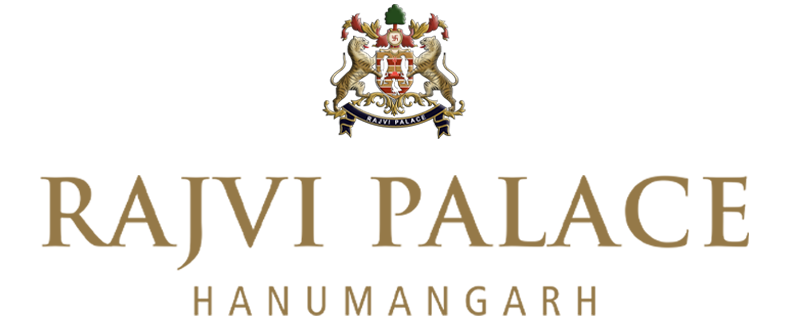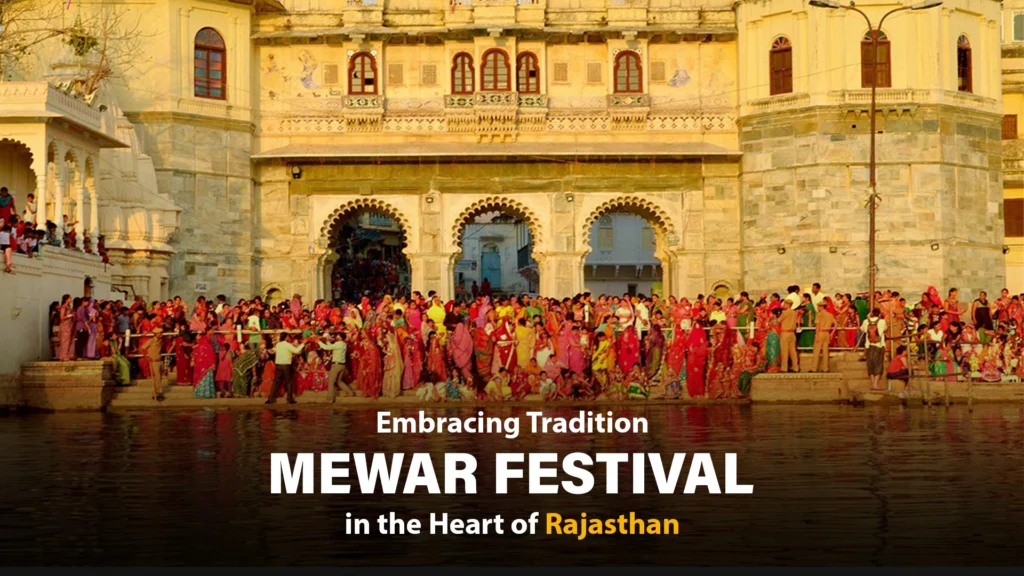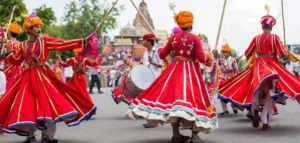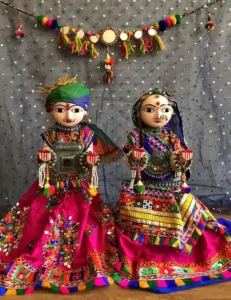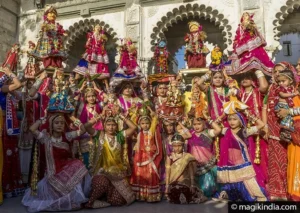The Mewar Festival is a lively celebration deeply rooted in the culture and traditions of Udaipur, Rajasthan. It holds significant cultural and traditional importance for the locals, marking the arrival of spring and commemorating the marriage of Lord Shiva and Goddess Parvati. This festival typically takes place in the months of March or April, bringing joy and vibrancy to the city of Udaipur.
Mewar Festival: Atmosphere and Activities
During the Mewar Festival, the city of Udaipur comes alive with a vibrant atmosphere that captivates both locals and tourists alike. Streets are adorned with colorful decorations, and the air is filled with excitement and joy. Various activities take place throughout the festival, creating an immersive experience for everyone involved.
Processions form a significant part of the festival, with locals parading through the streets in traditional attire, carrying idols of Isar (Lord Shiva) and Gangaur (Goddess Parvati). The streets resonate with the sounds of singing, dancing, and devotional music concerts, showcasing the rich cultural heritage of Rajasthan.
One of the most spectacular highlights of the festival is the fireworks display, illuminating the night sky with bursts of color and light. These fireworks symbolize the festive spirit and add to the overall spectacle of the celebration.
Local women play a central role in the Mewar Festival, adorning themselves in their finest traditional clothing and jewelry. They actively participate in various rituals and cultural activities, adding to the charm and authenticity of the festivities. Their involvement not only preserves the cultural essence of the festival but also contributes to its inclusivity and diversity.
Moreover, the Mewar Festival holds great attraction for tourists from around the world who flock to Udaipur to witness and experience the cultural extravaganza firsthand. It offers visitors a unique opportunity to immerse themselves in the vibrant traditions and customs of Rajasthan, creating lasting memories and fostering cultural exchange.
Overall, the Mewar Festival is more than just a celebration; it is a testament to the rich cultural heritage of Udaipur and serves as a platform for locals and tourists alike to come together and revel in the spirit of unity, joy, and tradition.
Mewar Festival 2024
The Mewar Festival 2024 is set to unfold over three days, promising an array of religious and cultural events that showcase the rich heritage of Udaipur. Organized by Rajasthan Tourism in collaboration with the Udaipur District Administration, this year’s festivities are eagerly anticipated by locals and tourists alike. However, it’s essential to note that due to ongoing COVID-19 regulations, there might be potential changes or cancellations in the schedule to ensure the safety of all participants.
March 27th, 2024: Gangaur Procession
March 27th marks the commencement of the Mewar Festival with the auspicious Gangaur Procession, a key religious event predominantly celebrated by women. This colorful procession is characterized by intricate rituals and fervent devotion, making it a highlight of the festival.
The day begins with the adornment of Isar (Lord Shiva) and Gangaur (Goddess Parvati) idols by local women in their finest traditional attire. These rituals hold deep spiritual significance as they symbolize the celebration of the divine union between Shiva and Parvati.
As the sun sets, the procession sets off from the iconic clock tower, winding its way through the bustling streets of Udaipur. Led by women carrying beautifully decorated idols, accompanied by traditional music and chants, the procession creates a mesmerizing spectacle.
The route culminates at Gangaur Ghat, situated along the serene shores of Lake Pichola. Here, amidst the tranquil waters, the idols are reverently immersed, symbolizing the culmination of the festivities. This immersion ceremony holds profound symbolism, signifying the merging of the divine energies of Shiva and Parvati with the elements of nature.
Throughout the procession and immersion ceremony, prayers are fervently offered by both married and single women. Married women pray for the well-being and longevity of their husbands and families, while unmarried women seek blessings for finding a suitable life partner. These heartfelt prayers add an emotional depth to the proceedings, underscoring the deeply ingrained spiritual beliefs and traditions associated with the Gangaur Procession.
March 28th, 2024 – The Cultural Events
March 28th brings forth a day filled with vibrant cultural activities as part of the Mewar Festival. At Gangaur Ghat, locals and visitors alike gather to immerse themselves in the rich cultural tapestry of Rajasthan.
The day kicks off with captivating folk performances at Gangaur Ghat, showcasing the traditional music, dance, and storytelling of the region. These performances, steeped in centuries-old traditions, offer a glimpse into the cultural heritage of Rajasthan and leave spectators spellbound with their rhythmic beats and colorful costumes.
The Cultural Events feature traditional dress competitions, where participants adorn themselves in elaborate attire reflective of Rajasthan’s diverse cultural landscape. The competition not only celebrates the intricacies of traditional clothing but also serves as a platform for preserving and promoting indigenous craftsmanship.
Local songs and dances further enliven the atmosphere, with performers showcasing their talents in various folk forms such as Ghoomar, Kalbelia, and Bhavai. These mesmerizing performances transport audiences to a bygone era, evoking a sense of nostalgia for the rich cultural heritage of Rajasthan.
Devotional music concerts add a spiritual dimension to the festivities, with melodious hymns and bhajans filling the air with a sense of reverence and devotion. These soul-stirring performances serve as a reminder of the festival’s roots in ancient religious traditions and underscore the enduring significance of spirituality in Rajasthani culture.
March 29th, 2024 – Rural Gangaur Fair at Gogunda
On March 29th, the Mewar Festival extends its cultural extravaganza to the rural hinterlands with the Rural Gangaur Fair held in Gogunda, a scenic town located 40 km from Udaipur. This fair offers a unique opportunity to experience the authentic charm of Rajasthan’s countryside.
The Rural Haat Bazaar, a bustling marketplace teeming with local artisans and craftsmen, showcases a diverse array of traditional handicrafts, textiles, and culinary delights. Visitors can immerse themselves in the sights, sounds, and flavors of rural Rajasthan, interacting with artisans and indulging in the region’s culinary delights.
Highlighting the Rural Gangaur Fair is the Gangaur Procession, a grand spectacle that encapsulates the essence of the festival. Adorned with colorful attire and adorned with traditional jewelry, participants traverse the streets of Gogunda, accompanied by lively music and dancing.
A major highlight of the Rural Gangaur Fair is the Walar dance, a folk dance indigenous to the Mewar region. This energetic dance form, characterized by intricate footwork and lively rhythms, captivates audiences with its exuberance and vitality, leaving a lasting impression on all who witness it.
Mewar Festival
The Mewar Festival epitomizes the rich tapestry of culture and tradition that defines Rajasthan, offering a unique blend of religious fervor and cultural splendor. As the festival draws to a close, we invite readers to immerse themselves in the vibrant celebrations in Udaipur, where they can witness firsthand the timeless rituals and enchanting performances that characterize this annual extravaganza.
Beyond its immediate festivities, the Mewar Festival serves as a custodian of Rajasthan’s rich heritage, preserving and promoting its cultural legacy for generations to come. Through its colorful processions, lively performances, and spirited celebrations, the festival reaffirms the enduring spirit of Rajasthan and its unwavering commitment to preserving its unique cultural identity.
